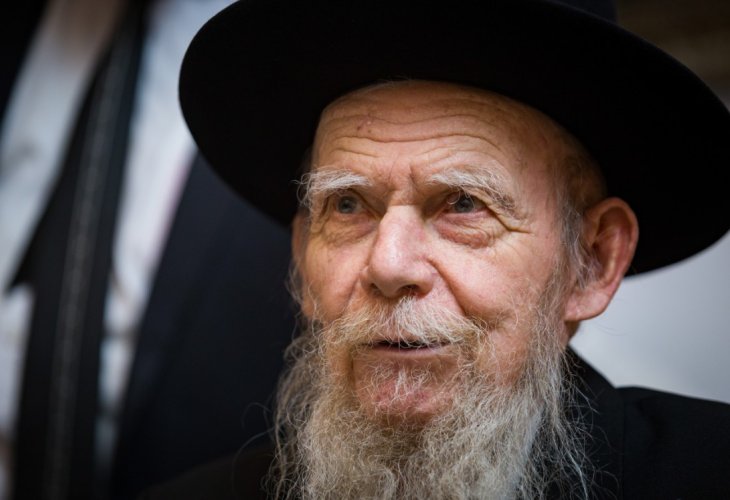Personal Stories
From Shorts to Faith: The Story of a Man Who Found His Way Back
A touching story of Rabbi Tzvi Pesach Frank’s unique decision to help a lost soul find his way back to Jewish practice.
 Rabbi Gershon Edelstein (Illustration photo: Flash 90)
Rabbi Gershon Edelstein (Illustration photo: Flash 90)Rabbi Yitzchak Zilberstein, a respected member of the Council of Torah Sages and Rabbi of Ramat Elchanan, shared a moving story in the name of Rabbi Yitzchak Gadaliah Edelstein. This story explains why Rabbi Tzvi Pesach Frank, a great halachic authority, allowed a man wearing shorts to serve as a prayer leader, even though Jewish law generally prohibits this.
Rabbi Zilberstein recalls a fascinating event that took place in the study hall of Rabbi Tzvi Pesach Frank, the respected Rabbi of Jerusalem. Curious about the story, Rabbi Zilberstein turned to Rabbi Yitzchak Gadaliah Edelstein, the head of the Ponevezh Yeshiva, for clarity. Rabbi Edelstein gave him a remarkable answer.
Rabbi Tzvi Pesach Frank, author of the important halachic works Har Tzvi and Mikraei Kodesh, lived in a modest apartment on Malachi Street in Jerusalem. Each day, members of the congregation would gather at his home for prayer, engaging in warm, informal conversations with the Rabbi beforehand.
One day, as Rabbi Frank was sitting and chatting with his congregants, the door opened, and in walked a man. He had a full head of hair, was not wearing a kippah, and was dressed in shorts, a common style of the time. The man asked Rabbi Frank, "When is the afternoon prayer?" The Rabbi answered, "In ten minutes." The man returned after the ten minutes had passed, still in his shorts, but now with a crumpled kippah on his head. He asked, "May I lead the prayer?" Rabbi Frank replied simply, "Please do."
The man put on a tallit, stepped up to the podium, and led the afternoon prayer, then continued to lead the evening prayer, including the recitation of Kaddish. Afterward, he inquired about the time for morning prayers, and once Rabbi Frank told him it was at 7 o'clock, he quietly left.
Some congregants were puzzled by the Rabbi’s decision to allow this man to lead the prayer. They respectfully asked Rabbi Frank how he could permit such a thing. Rabbi Frank responded, saying that if anyone was unsatisfied with the decision, they could pray elsewhere. However, when Torah scholars in the congregation asked with humility, Rabbi Frank explained that his decision was driven by compassion. He said, "If I hadn't allowed him to lead the prayer, no one else would have."
The next day, the man returned, but this time he was dressed in long pants and a proper kippah. He wore tefillin and led the morning prayer, then left without saying a word. This continued for about two weeks. The man would come to pray twice a day, always leaving immediately afterward.
One day, after prayer, Rabbi Frank signaled for him to come over. The man approached, and the Rabbi asked him about his identity. Rather than answer directly, the man said, "Rabbi, you have defeated me!"
Rabbi Frank, surprised, asked, "But I have never spoken to you more than two words." The man then explained, "Rabbi, I’m sure you remember the day I first came here. It was the day my mother passed away at the age of 96, and I loved her dearly. I live in the Kibbutz ‘Kalia,’ near the Dead Sea, and I am not religious.
Before my mother died, she made me promise I would say Kaddish for her. After her funeral, I made a test for myself. I decided that if the first synagogue I entered allowed me to lead the prayer, as I was, in shorts, I would keep my word and say Kaddish. But if they didn’t let me, I would consider myself free from the oath and would abandon my promise—and even worse, I would turn away from my faith.
But Rabbi, you won!" The Rabbi, deeply moved, embraced the man and said, "Oh! I have not merited such honor for parents!" The man began to cry, tears streaming down his face, and left, not returning for several weeks.
During that time, Rabbi Frank struggled with his decision, wondering if he should have said more to the man. But after several weeks, the man returned—now dressed in a suit and hat, with his appearance reflecting his newfound commitment to observance. He explained, "After you embraced me and said what you did, I was deeply moved. I went back to the kibbutz, settled all my affairs, and now I am a completely observant Jew, God willing!"
Rabbi Frank was taken aback. How had he allowed someone dressed in a way that, according to tradition, was forbidden to pray, let alone lead prayer? Rabbi Zilberstein explained that there is a halachic principle which permits one to violate certain laws to save a person from spiritual harm. In this case, Rabbi Frank understood that by allowing this man to lead prayer, he was giving him the opportunity to return to faith and fulfill his promise to his mother. It was an act of kindness that ultimately led the man back to Judaism.
This incredible story demonstrates how compassion and understanding can sometimes be the key to guiding someone back to the path of Torah and mitzvot (commandments). Rabbi Frank’s actions remind us of the importance of mercy and the power of a kind word in a world full of challenges.

